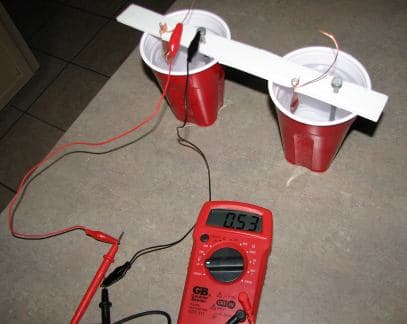
-----
Science experiment testing different electrolytes for batteries
My friend and I are eighth grade students conducting a science project involving batteries. We placed various liquids in 4 separate plastic cups (soda, orange juice, vinegar ⇦in bulk on eBay or Amazon [affil link] , and distilled water). In each cup, we suspended a flattened copper pipe strap and a galvanized nail. We hooked up a volt meter to the terminals and tested each "battery" separately. Each "battery" gave reading around 0.5 volts, but we were surprised to find that the voltage reading across the "distilled water" battery at 0.7 volts! How can this be?

Jeff N. [last name deleted for privacy by Editor]
Student - Gonzales, Louisiana, USA
December 31, 2010
It looks like you have 2 batteries hooked in parallel. can you send a diagram of the hookup?
James Watts- Navarre, Florida
January 18, 2011
I see that the right cup copper wire appears to end and is not connected to anything.
Do not have 2 cups connected by anything, even a non conductor to be positive.
Boil the distilled water and cool it in a covered dish/cup. This will get the CO2 out and make it less conductive. Some distilled water has ozone or other things added to kill bugs, so it is not really distilled water.
Really pure water is a very poor conductor, so you should not get a voltage. Some copper and or zinc can dissolve in water over a longer period of time, so use clean copper and nail and take a reading within a few minutes.
A nice adder to your paper would be to track the voltage over time if the water cup starts at zero.
- Navarre, Florida
January 20, 2011
Q, A, or Comment on THIS thread -or- Start a NEW Thread